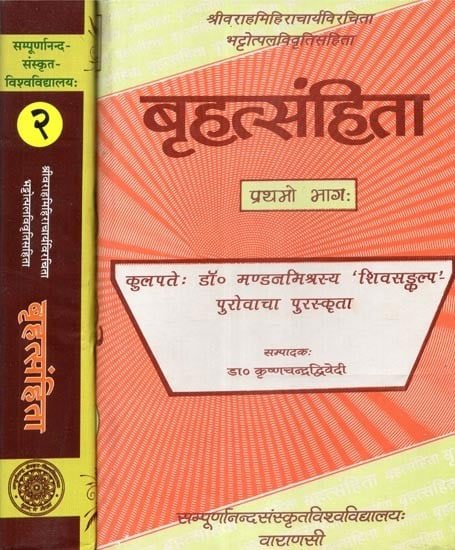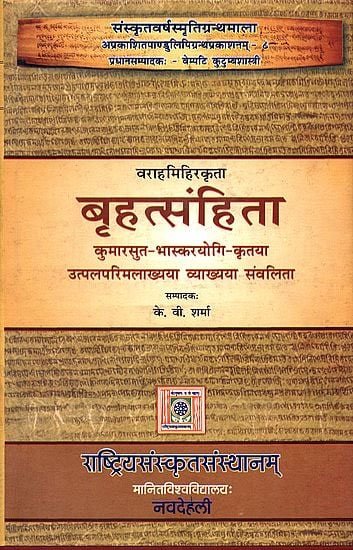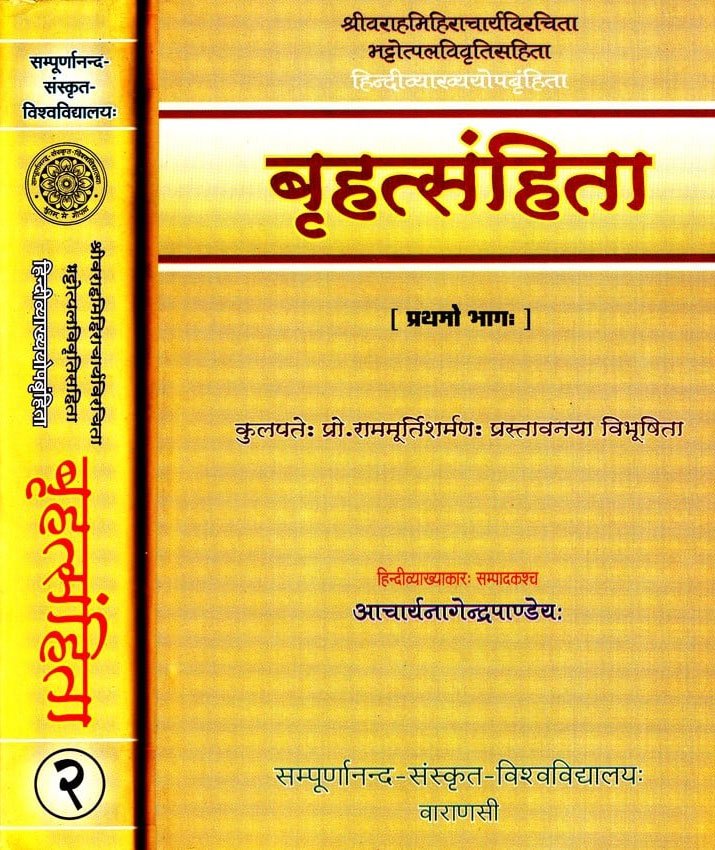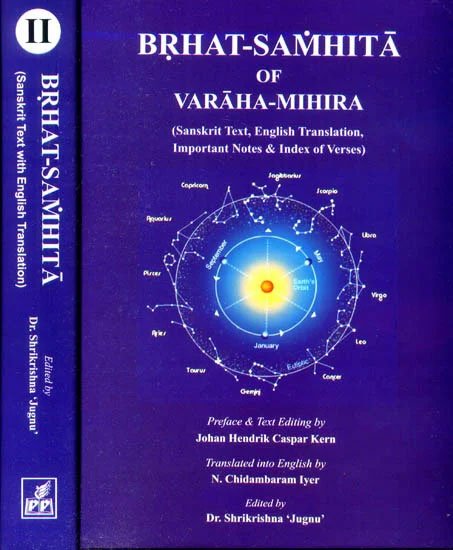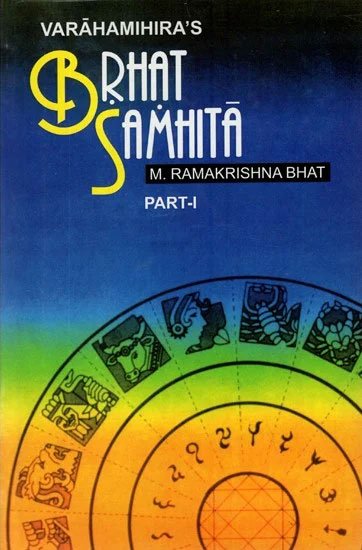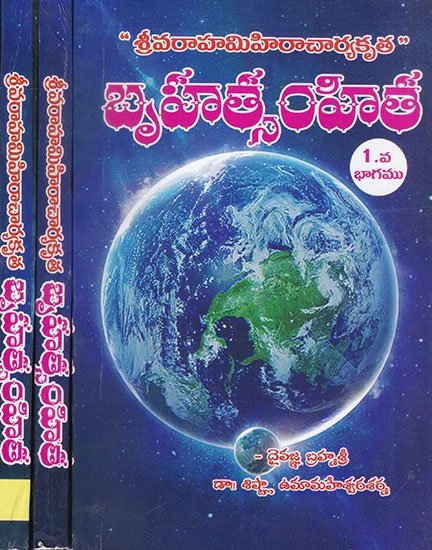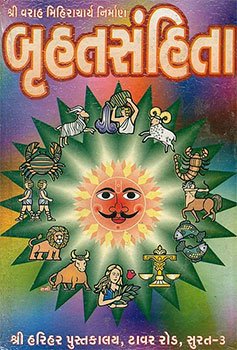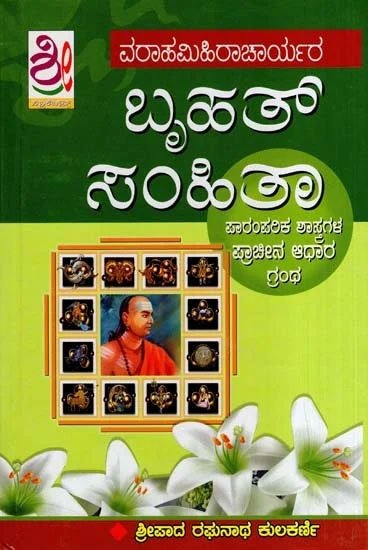Brihat-samhita [sanskrit]
26,560 words
The Sanskrit text of the Brihat-samhita from the 6th-century authored by Varaha Mihira in present-day Ujjain, India. It primarily deals with astrology and astronomy but is presented as an encyclopedia of knowledge.
Verse 42.66
रज्जूत्सङ्गच्छेदने बालपीडा राज्ञो मातुः पीडनं मातृकायाः ।
यद्यत्कुर्युश्चारणा बालका वा तत्तत्तादृग्भावि पापं शुभं वा ॥ ६६ ॥
[बालकाश्चारणा]
rajjūtsaṅgacchedane bālapīḍā rājño mātuḥ pīḍanaṃ mātṛkāyāḥ |
yadyatkuryuścāraṇā bālakā vā tattattādṛgbhāvi pāpaṃ śubhaṃ vā || 66 ||
[bālakāścāraṇā]
The Sanskrit text of Verse 42.66 is contained in the book Brihata Samhita (Sanskrit Text with Hindi Translation) by Pandit Achyutananda Jha. This book is available online or you could buy the latest edition:
Read online Buy now! The Sanskrit text by Pandit Achyutananda Jha (2001)
Glossary of Sanskrit terms
Note: This extracts Sanskrit terms and links to English definitions from the glossary, based on an experimental segmentation of verse (42.66). Some terms could be superfluous while some might not be mentioned. Click on the word to show English definitions.
Rajju, Utsanga, Ccha, Balapi, Ida, Rajan, Matri, Matu, Pidana, Matrika, Yat, Yad, Carana, Balaka, Tat, Tad, Tadrik, Tadrish, Bhavin, Bhavi, Papam, Papa, Shubha, Shubh,
Analysis of Sanskrit grammar
Note: this is an experimental feature and only shows the first possible analysis of the Sanskrit text (Verse 42.66). If the system was successful in segmenting the sentence, you will see of which words it is made up of, generally consisting of Nouns, Pronouns, Verbs, Participles and Indeclinables. Click on the link to show all possible derivations of the word.
- Line 1: “rajjūtsaṅgacchedane bālapīḍā rājño mātuḥ pīḍanaṃ mātṛkāyāḥ ”
- rajjū -
-
rajju (noun, feminine)[compound], [adverb], [nominative dual], [vocative dual], [accusative dual]
- utsaṅga -
-
utsaṅga (noun, masculine)[compound], [vocative single]utsaṅga (noun, neuter)[compound], [vocative single]
- cche -
-
ccha (noun, masculine)[locative single]ccha (noun, neuter)[nominative dual], [vocative dual], [accusative dual], [locative single]
- da -
-
da (noun, masculine)[compound], [vocative single]da (noun, neuter)[compound], [vocative single]
- ne -
-
na (noun, masculine)[locative single]na (noun, neuter)[nominative dual], [vocative dual], [accusative dual], [locative single]nā (noun, feminine)[nominative dual], [vocative single], [vocative dual], [accusative dual]ni (noun, masculine)[vocative single]ni (noun, feminine)[vocative single]
- bālapī -
-
bālapi (noun, masculine)[compound], [adverb], [nominative dual], [vocative dual], [accusative dual]bālapi (noun, feminine)[compound], [adverb], [nominative dual], [vocative dual], [accusative dual]bālapi (noun, neuter)[compound], [adverb], [nominative single], [vocative single], [accusative single]
- iḍā* -
-
iḍa (noun, masculine)[nominative plural], [vocative plural]iḍā (noun, feminine)[nominative plural], [vocative plural], [accusative plural]
- rājño* -
-
rājan (noun, masculine)[accusative plural], [ablative single], [genitive single]
- mātuḥ -
-
mātṛ (noun, masculine)[ablative single], [genitive single]mātu (noun, masculine)[nominative single]mātṛ (noun, feminine)[ablative single], [genitive single]
- pīḍanam -
-
pīḍana (noun, masculine)[adverb], [accusative single]pīḍana (noun, neuter)[adverb], [nominative single], [accusative single]pīḍanā (noun, feminine)[adverb]
- mātṛkāyāḥ -
-
mātṛkā (noun, feminine)[ablative single], [genitive single]
- Line 2: “yadyatkuryuścāraṇā bālakā vā tattattādṛgbhāvi pāpaṃ śubhaṃ vā || 66 |”
- yad -
-
yat (indeclinable relative)[indeclinable relative]yat (noun, masculine)[compound]yad (noun, masculine)[compound], [adverb], [nominative single], [vocative single]yat (noun, neuter)[nominative single], [vocative single], [accusative single]√i -> yat (participle, neuter)[nominative single from √i class 2 verb], [vocative single from √i class 2 verb], [accusative single from √i class 2 verb]yat (pronoun, neuter)[nominative single], [accusative single]
- yat -
-
yat (indeclinable relative)[indeclinable relative]yat (noun, masculine)[compound]yad (noun, masculine)[compound], [adverb], [nominative single], [vocative single]yat (noun, neuter)[nominative single], [vocative single], [accusative single]√i -> yat (participle, neuter)[nominative single from √i class 2 verb], [vocative single from √i class 2 verb], [accusative single from √i class 2 verb]yat (pronoun, neuter)[nominative single], [accusative single]
- kuryuś -
-
√kṛ (verb class 8)[optative active third plural]
- cāraṇā* -
-
cāraṇa (noun, masculine)[nominative plural], [vocative plural]cāraṇā (noun, feminine)[nominative plural], [vocative plural], [accusative plural]
- bālakā* -
-
bālaka (noun, masculine)[nominative plural], [vocative plural]bālakā (noun, feminine)[nominative plural], [vocative plural], [accusative plural]
- vā -
-
vā (indeclinable conjunction)[indeclinable conjunction]vā (noun, feminine)[nominative single]√vā (verb class 1)[imperative active second single]
- tat -
-
tat (indeclinable correlative)[indeclinable correlative]tad (noun, neuter)[compound], [nominative single], [accusative single]
- tat -
-
tat (indeclinable correlative)[indeclinable correlative]tad (noun, neuter)[compound], [nominative single], [accusative single]
- tādṛg -
-
tādṛk (indeclinable)[indeclinable]tādṛś (noun, masculine)[compound], [adverb], [nominative single], [vocative single]tādṛś (noun, neuter)[compound], [adverb], [nominative single], [vocative single], [accusative single]
- bhāvi -
-
bhāvin (noun, masculine)[compound], [adverb]bhāvin (noun, neuter)[compound], [adverb], [nominative single], [vocative single], [accusative single]bhāvī (noun, masculine)[compound], [adverb]bhāvī (noun, feminine)[compound], [adverb], [vocative single]bhāvī (noun, neuter)[compound], [adverb], [nominative single], [vocative single], [accusative single]√bhū (verb class 1)[injunctive middle third single]
- pāpam -
-
pāpam (indeclinable)[indeclinable]pāpa (noun, masculine)[adverb], [accusative single]pāpa (noun, neuter)[adverb], [nominative single], [accusative single]pāpā (noun, feminine)[adverb]
- śubham -
-
śubha (noun, masculine)[adverb], [accusative single]śubha (noun, neuter)[adverb], [nominative single], [accusative single]śubhā (noun, feminine)[adverb]śubh (noun, feminine)[accusative single]
- vā* -
-
- Cannot analyse 66
Other editions:
Also see the following editions of the Sanskrit text or (alternative) English translations of the Verse 42.66
Brhatsamhita with the Commentary of Bhattotpala
by Krishna Chandra Dwivedi (2016)
Publisher: Sampurnanand Sanskrit University; 1229 pages;
Buy now!
Brihat Samhita with the Commentary of Utpalapatimala of Yogisvara
by K. V. Sharma (2012)
Publisher: Rashtriya Sanskrit Sansthan, Janakpuri; 754 pages; ISBN-10; 8186111360; ISBN-13: 9788186111369
Buy now!
Brihat Samhita (Hindi Translation)
by K. V. Sharma (2002)
Publisher: Sampurnanand Sanskrit University; 2359 pages; ISBN-13: 9789387890008.
Buy now!
Brhat Samhita (English translation)
by N. Chidambaram Iyer (2022)
Publisher: Parimal Publication Pvt. Ltd.; 801 pages; Edited by Dr. Shrikrishna Jugnu; ISBN-10: 8171104215; ISBN-13: 9788171104215.
Buy now!
Brhat Samhita (English with notes)
by M. Ramakrishna Bhat (2010)
Publisher: Motilal Banarsidas Publishers Pvt. Ltd.; 1155 pages; ISBN-10: 8120810600; ISBN-13: 9788120810600.
Buy now!
Brhat Samhita (Telugu translation)
by Sishtla Umamaheswara Sharma (2020)
Publisher: Mohan Publications, Andhra Pradesh; 846 pages.
Buy now!Preview of verse 42.66 in Kannada sript:
ರಜ್ಜೂತ್ಸಙ್ಗಚ್ಛೇದನೇ ಬಾಲಪೀಡಾ ರಾಜ್ಞೋ ಮಾತುಃ ಪೀಡನಂ ಮಾತೃಕಾಯಾಃ ।
ಯದ್ಯತ್ಕುರ್ಯುಶ್ಚಾರಣಾ ಬಾಲಕಾ ವಾ ತತ್ತತ್ತಾದೃಗ್ಭಾವಿ ಪಾಪಂ ಶುಭಂ ವಾ ॥ ೬೬ ॥
[ಬಾಲಕಾಶ್ಚಾರಣಾ]
Brhat Samhita (Gujarati translation)
by - (2000)
Publisher: Shree Harihar Pustakalay, Surat; Author: Shri Varahamihira Acharya (શ્રી વરાહમિહીરાચાર્ય); 432 pages.
Buy now!Preview of verse 42.66 in Gujarati sript:
રજ્જૂત્સઙ્ગચ્છેદને બાલપીડા રાજ્ઞો માતુઃ પીડનં માતૃકાયાઃ ।
યદ્યત્કુર્યુશ્ચારણા બાલકા વા તત્તત્તાદૃગ્ભાવિ પાપં શુભં વા ॥ ૬૬ ॥
[બાલકાશ્ચારણા]
Brhat Samhita (Kannada translation)
by Sripada Raghunatha Kulkarni (2021)
Publisher: Srinidhi Publications, Bangalore; 668 pages with illustrations.
Buy now!Preview of verse 42.66 in Kannada sript:
ರಜ್ಜೂತ್ಸಙ್ಗಚ್ಛೇದನೇ ಬಾಲಪೀಡಾ ರಾಜ್ಞೋ ಮಾತುಃ ಪೀಡನಂ ಮಾತೃಕಾಯಾಃ ।
ಯದ್ಯತ್ಕುರ್ಯುಶ್ಚಾರಣಾ ಬಾಲಕಾ ವಾ ತತ್ತತ್ತಾದೃಗ್ಭಾವಿ ಪಾಪಂ ಶುಭಂ ವಾ ॥ ೬೬ ॥
[ಬಾಲಕಾಶ್ಚಾರಣಾ]
![Brihat-samhita [sanskrit] - book cover](/uploads/a/Brihat-Samhita-Sanskrit.jpg)
